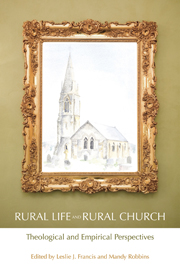Book contents
- Frontmatter
- Contents
- Preface
- Foreword by The Bishop of Shrewsbury, The Rt Revd Mark Rylands
- 1 Introduction: shaping rural theology
- PART 1 PERSPECTIVES FROM THE BIBLE
- PART 2 PERSPECTIVES FROM ORDINARY THEOLOGY
- PART 3 THEOLOGICAL AND SOCIOLOGICAL PERSPECTIVES
- 8 Encountering New Age spirituality: opportunities and challenges for the rural church
- 9 God in creation: a reflection on Jürgen Moltmann's theology
- 10 Belonging to rural church and society: theological and sociological perspectives
- PART 4 HISTORICAL PERSPECTIVES
- PART 5 LISTENING TO VISITORS
- PART 6 LISTENING TO THE COMMUNITY
- PART 7 LISTENING TO CHURCHGOERS
- PART 8 LISTENING TO CHURCH LEADERS
- PART 9 SATISFACTION AND STRESS IN MINISTRY
- Contributors
- Sources
- Subject Index
- Name Index
10 - Belonging to rural church and society: theological and sociological perspectives
from PART 3 - THEOLOGICAL AND SOCIOLOGICAL PERSPECTIVES
- Frontmatter
- Contents
- Preface
- Foreword by The Bishop of Shrewsbury, The Rt Revd Mark Rylands
- 1 Introduction: shaping rural theology
- PART 1 PERSPECTIVES FROM THE BIBLE
- PART 2 PERSPECTIVES FROM ORDINARY THEOLOGY
- PART 3 THEOLOGICAL AND SOCIOLOGICAL PERSPECTIVES
- 8 Encountering New Age spirituality: opportunities and challenges for the rural church
- 9 God in creation: a reflection on Jürgen Moltmann's theology
- 10 Belonging to rural church and society: theological and sociological perspectives
- PART 4 HISTORICAL PERSPECTIVES
- PART 5 LISTENING TO VISITORS
- PART 6 LISTENING TO THE COMMUNITY
- PART 7 LISTENING TO CHURCHGOERS
- PART 8 LISTENING TO CHURCH LEADERS
- PART 9 SATISFACTION AND STRESS IN MINISTRY
- Contributors
- Sources
- Subject Index
- Name Index
Summary
Abstract – Recent writing has focused on the ‘network’ dimension of belonging, with the inference that geographical belonging is of more limited importance. This article examines the continuing significance of the latter concept with reference to the rural English community and parish church. Key categories of individuals with a claim to belong in the English countryside are identified and the notion of belonging as a theological concept is expanded. A fourfold model of belonging to activities, people, events and places is developed and used to investigate how the ministry of the parish church relates to those who would define themselves as belonging with it.
Introduction
Much has been written in recent years to put forward the theory that in British society belonging is now less to do with neighbourhood or geography than with communities of interest. Mission-Shaped Church (Archbishops' Council, 2004, p. 4) states, ‘In a network society the importance of place is secondary to the importance of “flows”.’ There is some truth in the increased importance of non-geographical belonging, and the need for churches among others to be attentive to the challenges and opportunities presented, but this should not be allowed to cloud the fact that for many people their belonging with, or alienation from, specific geographical communities plays a vital role in their lives; perhaps no more so than in the countryside, where the connection with place may remain at its strongest.
This article follows the definitions of Francis and Robbins (2004), over against Davie (1994), in taking Christian belonging as ‘selfdefined religious affiliation’ rather than collapsing it into either doctrinal affirmation or participation in specified activities. Even in looking at the wider concept of rural living, the distinction between participation in activities and general notions of identity remains extremely useful.
- Type
- Chapter
- Information
- Rural Life and Rural ChurchTheological and Empirical Perspectives, pp. 105 - 118Publisher: Acumen PublishingPrint publication year: 2012

